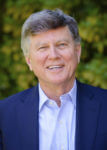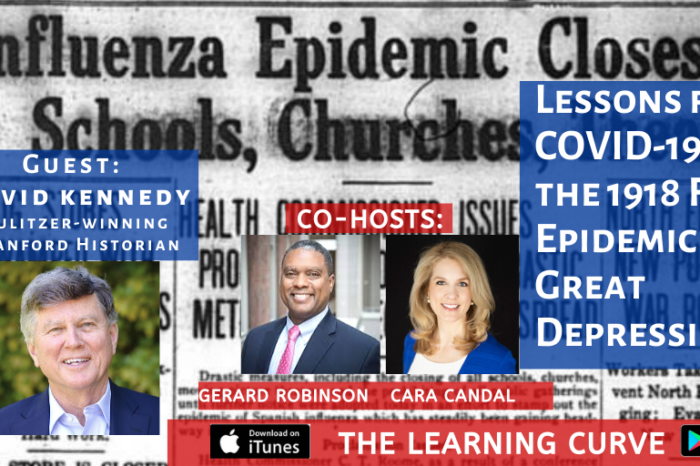Stanford Pulitzer Winner David Kennedy on Lessons for COVID-19 from the 1918 Flu Epidemic & Great Depression
/0 Comments/in COVID Podcasts, Featured, Podcast, rCOVID, US History /by Editorial StaffThis week on “The Learning Curve” Cara and Gerard continue coverage of COVID-19’s impact on K-12 education, joined by Pulitzer-winning historian David Kennedy, the Donald J. McLachlan Professor of History Emeritus at Stanford University. Professor Kennedy describes some of the distinguishing characteristics of the COVID-19 pandemic, compared to the 1918 flu and the Bubonic Plague in terms of rapidity, scale, mortality rate, and death toll. They also delve into differences, such as our society’s technological advancements, that help ease the disruption; governments’ data gathering capacity to fully understand the impact, and ability to mobilize; and the credibility of our leadership and institutions. They explore whether public health crises have received sufficient attention in K-12 history instruction, and what goes unreported in most accounts; and discuss the delicate balance between protecting civil liberties while avoiding the dangers of spreading misinformation.
Stories of the Week: The Florida Virtual School is gearing up to train teachers to deliver over 100 K-12 courses in mathematics, English language arts, history, science, electives, Advanced Placement, and career and technical education to 2.7 million students, at no cost, until June 30. A Gallup survey reveals that 42 percent of parents are concerned about COVID-19 school closures’ negative impact on their child’s education, and 11 percent are not using any educational resources to fill the instructional gap.
Newsmaker Interview Guest:
 David Kennedy is the Donald J. McLachlan Professor of History Emeritus at Stanford University. Professor Kennedy received the Dean’s Award for Distinguished Teaching in 1988. He is the current editor (since 1999) of the Oxford History of the United States series. Kennedy was awarded the Pulitzer Prize for History in 2000 for Freedom from Fear: The American People in Depression and War. His book Over Here: The First World War and American Society explored America’s political, economic, and domestic life during World War I. Kennedy received his B.A. in History from Stanford University and his M.A. and Ph.D. in American Studies from Yale University.
David Kennedy is the Donald J. McLachlan Professor of History Emeritus at Stanford University. Professor Kennedy received the Dean’s Award for Distinguished Teaching in 1988. He is the current editor (since 1999) of the Oxford History of the United States series. Kennedy was awarded the Pulitzer Prize for History in 2000 for Freedom from Fear: The American People in Depression and War. His book Over Here: The First World War and American Society explored America’s political, economic, and domestic life during World War I. Kennedy received his B.A. in History from Stanford University and his M.A. and Ph.D. in American Studies from Yale University.
Tweet of the Week:
Amid Dispute over Charter School Resolution, President of San Diego of NACCP Chapter Suspended by National Board
by @SDUTmcdonald #CharterSchools #SchoolChoicehttps://t.co/DgTNAegX5F
— Choice Media (@ChoiceMediatv) March 30, 2020
The next episode will air on April 10th with guest, Tim Keller, a Senior Attorney at Institute for Justice.
Newslinks
By May, nearly 3 million Florida K-12 students may be using state’s digital district curriculum | Florida | thecentersquare.com
42% of Parents Worry COVID-19 Will Affect Child’s Education
https://news.gallup.com/poll/305819/parents-worry-covid-affect-child-education.aspx
Get Updates on Our Education Research
Browse All Podcast Episodes:

Stanford’s Arnold Rampersad on Jackie Robinson

Pulitzer Winner Kai Bird on Robert Oppenheimer & the Atomic Bomb

Georgetown’s Dr. Marguerite Roza on Federal ESSER Funds & the Fiscal Cliff

Harlow Giles Unger on Patrick Henry & American Liberty

Prof. Joel Richard Paul on Daniel Webster, U.S. Senate, & “Liberty and Union”

Steven Wilson on Charter Public Schools

Sheldon Novick on Henry James, American Women, & Gilded-Age Fiction

USAF Academy’s Jeanne Heidler on Henry Clay & Congressional Statesmanship
 https://pioneerinstitute.org/wp-content/uploads/TLC-Shiloni-05292024-767x432-1.png
432
767
Editorial Staff
https://pioneerinstitute.org/wp-content/uploads/logo_440x96.png
Editorial Staff2024-05-29 16:14:072024-05-29 16:27:34Israeli Harvard Student Maya Shiloni on Campus Antisemitism
https://pioneerinstitute.org/wp-content/uploads/TLC-Shiloni-05292024-767x432-1.png
432
767
Editorial Staff
https://pioneerinstitute.org/wp-content/uploads/logo_440x96.png
Editorial Staff2024-05-29 16:14:072024-05-29 16:27:34Israeli Harvard Student Maya Shiloni on Campus Antisemitism
Kimberly Steadman of Edward Brooke on Boston’s Charter School Sector

Cheryl Brown Henderson on the 70th Anniversary of Brown v. Board of Education

POLITICO’s Peter Canellos on Justice John Marshall Harlan & Plessy v. Ferguson

Colonel Peter Hayden on U.S. Cyber Command & National Security

Hoover at Stanford’s Stephen Kotkin on Stalin’s Tyranny, WWII, & the Cold War

Johns Hopkins’ Ashley Berner on Educational Pluralism & Democracy

39th U.S. Poet Laureate Robert Pinsky for National Poetry Month

U.S. Chamber Foundation’s Hilary Crow on K-12 Civics Education

UCLA’s Ronald Mellor on Tacitus, Roman Emperors, & Despotism

Tufts Prof. Elizabeth Setren on METCO’s Proven Results

Pulitzer Winner Joan Hedrick on Harriet Beecher Stowe & Uncle Tom’s Cabin

Dr. Adrian Mims on The Calculus Project & STEM

Yale University Pulitzer Winner Beverly Gage on J. Edgar Hoover & the FBI

UK U-Warwick’s Benjamin Smith on Mexico’s Cartels & Drug Trade

DFER-MA’s Mary Tamer on MCAS & Teacher Strikes

U-TN’s Robert Norrell on Booker T. Washington & Voc-Tech

BC’s Dr. Matthias von Davier on TIMSS & K-12 Global STEM

ExcelinEd’s Dr. Cara Candal on National School Choice Week




